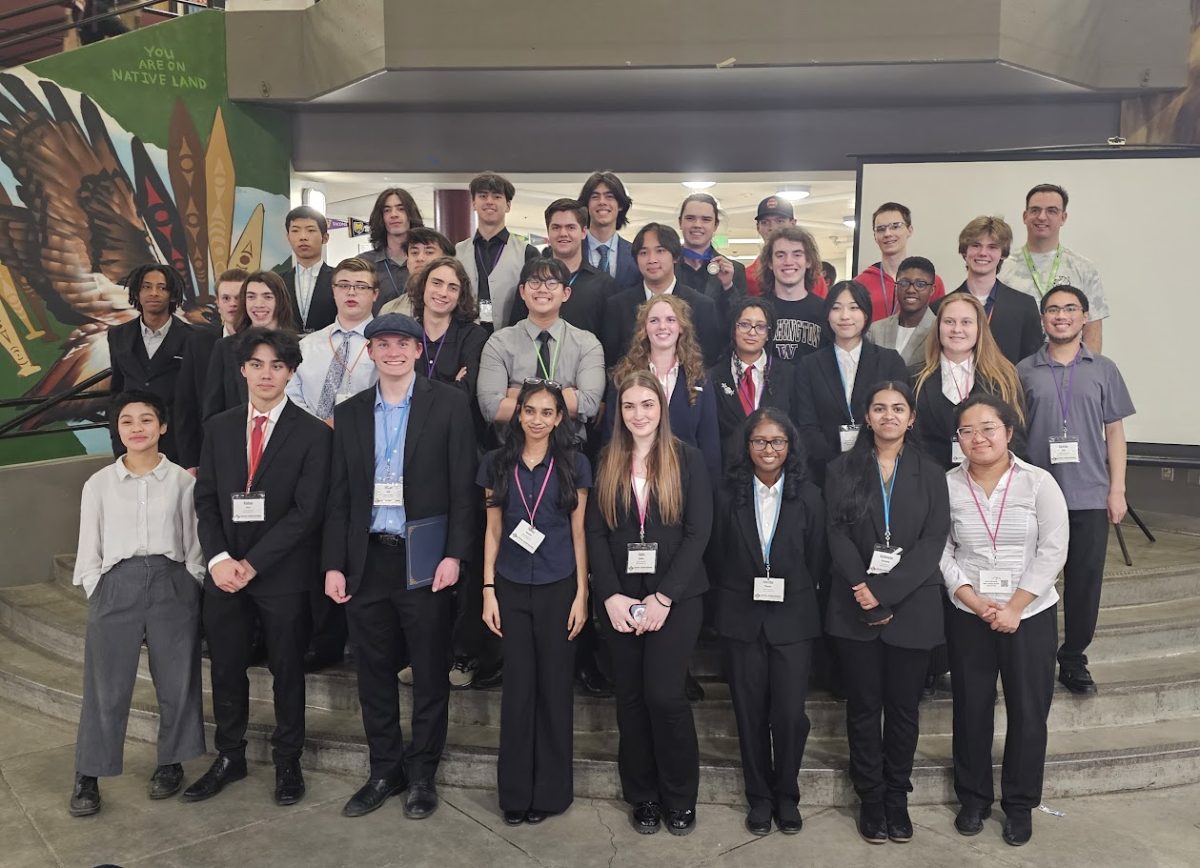The Washington state legislature is currently looking at bills and reacting to a major lawsuit that affect local students.
In late January, Washington senators held a hearing about free expression and press rights regarding student journalists. At the hearing, multiple student journalists spoke about how they felt they would be better prepared for “real world journalism” without prior restraint and prior review.
A representative of The Association of Washington School Principals also spoke, calling prior restraint and prior review necessary due to the fact that students could easily get hurt legally without the right supervision.
In addition, Washington lawmakers recently proposed a bill concerning public education funding in Washington state.
Lawmakers must respond to a recent lawsuit, the “McCleary case,” brought agains the state by two Washington families along with the Network for Excellence in Washington Schools (NEWS), in an attempt to “force the state to make good on its promise to each and every child in Washington,” their website states.
The final decision of the bill seems as if it will be pushed to next year, Edmonds School District Superintendent Nick Brossoit said.
Free Speech
On Thursday, Jan. 21, the senate Early Childhood and K-12 Education Committee heard testimony on SB 6233 that would clarify the press rights of student journalists in Washington state.
This is the third time in 10 years that legislators have considered this bill. The past two times it has been shut down, according to Washington Journalism Education Association (WJEA) Executive Director Kathy Schrier.
However, Schrier thinks this time will be different due to the fact that Republican Senator Joe Fain is behind the bill. Both times in the past, only Democrats supported the bill and Republicans “haven’t listened to the other side.”
This time the bill is “bipartisan,” with four Democrats and four Republicans sponsoring the bill.
“Having both on our side is really, really to our advantage,” Schrier said.
The law would make prior restraint, or school administrators forcing student-run publications to hold back stories, illegal. Schrier called this censorship and that it’s “clearly illegal,” but there is no law to show that. This law would provide that clarification.
Currently, in the Puyallup School District, the principals practice prior restraint and everything students do regarding news has to be reviewed and approved, for example.
Schrier said this practice puts school administration at risk of being held responsible for anything the student media has done improperly. This includes libel, slander and any other unethical journalism practices.
She continued, saying that principals don’t enjoy peering over the student made media and dropping everything just for prior review, but if they don’t and find themselves with a lawsuit, they’re legally responsible.
Eight other states have the bill present in their legislation, including Oregon, who Schrier said “copied Washington’s wording.”
No prior restraint or prior review has ever been in place at MTHS, by the way.
JEA and Scholastic Press Rights Committee Chairman John Bowen said he’s really pleased to see Washington “get such needed legislation underway again.” He said he hopes Washington passes the bill so other states will also try to propose a similar bill.
Bowen currently resides in Ohio, where there is no law or code that explicitly protects high school student publications against administrative censorship, according to the Student Press Law Center (SPLC) website.
Ohio attempted to pass a bill protecting student press rights after the Missouri court case (Hazelwood v. Kuhlmeier) decided that public school’s curricular student newspapers that have not been established as forums for student expression do not receive the same amount of First Amendment rights other newspapers would.
“Legislation provides support for those students and advisers who want to ensure learning and practical examples of the principles of civic engagement,” Bowen said.
Former staff attorney for the SPLC Mike Hiestand said this bill would “give back to students today the rights their parents had growing up.”
As an SPLC staff attorney, Hiestand would provide legal help to college and high school journalism students. When a student would call him, he said his first question to them would be “where are you calling from?” If they were in one of the eight states that had this bill passed, he would be able to give them good news regarding their legal problems. He said he wants to be able to give Washington students good news.
Hiestand went on, saying the legislation would probably make the least amount of difference to MTHS due to the fact that there has never been prior review or restraint present.
It would make a difference, however, to other schools where the principals insist on “clamping down and having crazy authority” over student media.
Schrier mentioned a school in Eastern Washington that wanted to run a story about Genetically Modified Organisms (GMOs). However, because Eastern Washington has a very prominent farming community and their farmers do use GMOs in their products, the principal didn’t want to upset anyone and told the newspaper staff that the story should be retracted and an apology issued. The implication was that no such similar stories would be allowed in the future. The students were intimidated, Schrier said, and the adviser was put in a very awkward position.
However, some think this bill could pose problems.
Government Relations Director of the Association of Washington School Principals (AWSP) Jerry Bender said this bill closes the gap between students and school administrators. The AWSP is currently opposing the bill.
Bender said he believes principals should be a part of the editorial decision process in student media to ensure no students are harmed after publication.
He gave an example of students at Emerald Ridge High School who wrote about oral sex. This caused a problem among teachers and other students, Bender said, and especially harmed the students quoted.
“If someone had been paying attention, this could have been prevented,” Bender said.
He also said a well trained journalism adviser is necessary, so the students don’t get themselves into legal trouble. The advisers should be weighing in with their own opinions, Bender said.
Bender said he’s seen places where the journalism product is poorly done and the principal is essentially a copy editor, which isn’t their job. He thinks principals should be speaking with students and helping to guarantee no problems arise.
“Some issues [that] pop up with this bill are framed as a free speech issue, but we think it’s a curricular issue,” Bender said.
Because the bill has already been presented to the Education Committee, Hiestand and Schrier believe they will see it make progress. After the bill gets voted out of the Education Committee, it is presented to the Rules Committee.
“The speed of this bill so far encouraged me,” Hiestand said. Schrier said, because four out of eight members of the Rules Committee are in favor of the bill, she believes it will pass and, from there, be sent to the House floor.
“It is looking hopeful, but we don’t want to get too excited,” Schrier said.
Schrier also said the WJEA takes this legislation seriously and it is a high priority, but the members of the association have to be careful because WJEA is a non-profit organization and can’t spend any money lobbying for legislation.
She said WJEA’s main job right now is ensuring people are aware of this legislation and know about it, because they’re supposed to be teaching students about journalism.
“The priority is on the side of just making sure everyone knows what [the bill is] about and why it’s important,” Schrier said.
Bowen agreed, saying the JEA and SPLC plan to work actively with Washington, supporting local approaches with ideas, endorsements and anything else that is available.
“We are very pleased Washington is moving forward and support [their] efforts totally,” Bowen said.
McCleary and Funding
Washington state lawmakers have recently proposed a bill regarding education funding after being sued by the Network for Excellence in Washington Schools (NEWS) filed a lawsuit in 2007 asking the courts to order the State of Washington to fully fund basic public education.
Edmonds School District (ESD) Superintendent Nick Brossoit is currently the president of NEWS.
According to the NEWS website, the suit was brought on behalf of two families: Matthew and Stephanie McCleary and their children, Kelsey and Carter and Robert and Patty Venema and their children, Halie and Robbie.
In the suit, NEWS sought to establish that the state of Washington was in violation of not fully funding education and the constitution.
“State funding is not ample, it is not stable, it is not dependable,” the NEWS website reads.
The lawsuit is also known as the “McCleary case.”
Lawmakers are currently under a court order to take on basic education costs that are being borne unconstitutionally by local school districts.
However, while the Supreme Court has discussed the McCleary case, it seems as if they will be pushing the final decision to the school year of 2017-18, according to Brossoit.
According to ESD Executive Director-Business & Operations Stewart Mhyre, it would take place by September 2017.
At the Jan. 26 ESD School Board Meeting, the members of the School Board discussed the McCleary case.
Director of District Five Diana White called it “confounding” that the state is neglecting funding basic education.
She continued, saying that this procrastination shows a lack of leadership in the state. She mentioned that the bill passed earlier this year on Jan. 20 to keep Washington charter schools open after a September court ruling declared them unconstitutional.
“The legislature sure did fix that charter school problem a while back, why are they ignoring the funding of public education?” White said.
Brossoit called this bill a priority for all of Washington state and said that everyone should be either knowing of the bill or supporting it. He also said the legislature has made a number of promises before in the past regarding public education and has not come through, so he isn’t sure whether or not to trust this time. White also said she doesn’t understand why the state is paying for other things, such as local construction, when she feels most are still asking for basic education to be fully funded.
“Why is the elephant in the room [the funding of public education] not being discussed?” White said.







